Tablet Press Machine
Qualipak’s advanced Tablet Press Machine is here! It is a machine that has been made with precision for the pharmaceutical industry and the confectionery industry. With our machine, you are guaranteed high-quality production of tablets all along. The equipment has modern technology and can be easily used allowing you to make more products in one go. Trust Qualipak today for higher production levels!
-
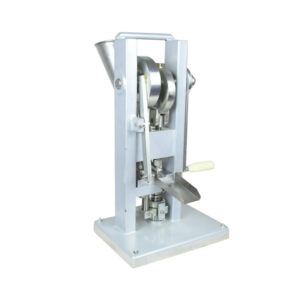
TDP-0 Single Punch Tablet Press
View Machines -
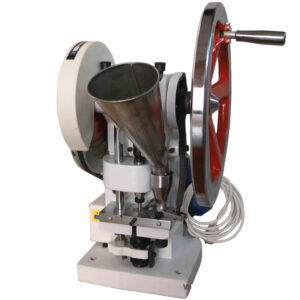
TDP-6 Single Punch Tablet Press
View Machines -
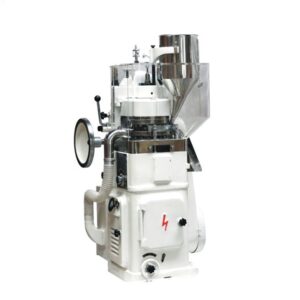
ZP17/19 Rotary Tablet Press
View Machines -
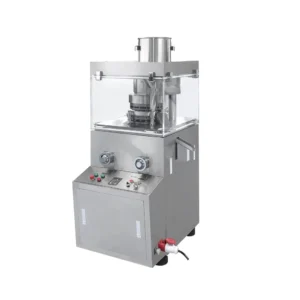
ZPW Rotary Tablet Press
View Machines -
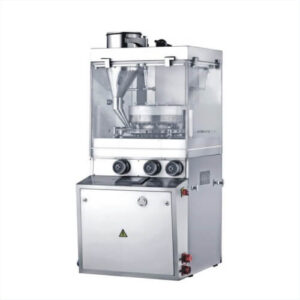
GZPL-680 Double Sided Rotary Tablet Press
View Machines -
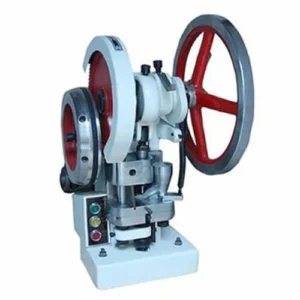
TDP-5 Single Punch Tablet Press
View Machines -
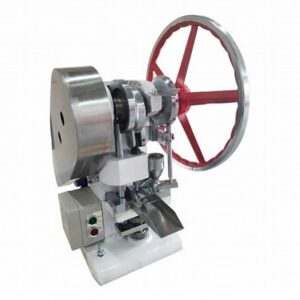
TDP-1 Single Punch Tablet Press
View Machines -
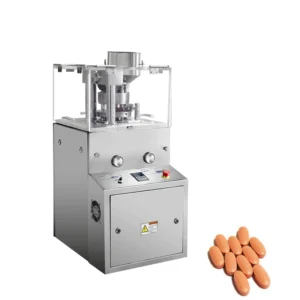
ZP11 Rotary Tablet Press
View Machines -
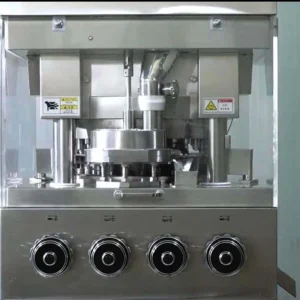
ZPY120 Rotary Tablet Press
View Machines
Introduction of Tablet Press Machines
Tablet press machines are very important in the pharmaceutical, food, chemical or other industries where tablets are a common form of dosage. These machines help to produce a large number of tablets by compressing powdered or granulated materials into solid tablets with uniform size, shape and weight. This all-inclusive guide is going to explore different aspects of tablet press machines including types of tablet press machines, working process of tablet press machines, application areas/fields/sectors for tablet presses along with their benefits, functions, future trends (maintaining the same word order), maintenance and training.
Types of Tablet Press Machines
There are several forms in which these machines come as each one of them is designed to meet specific production requirements and accommodate different materials. They include:
Single Punch Tablet Press: Such machinery as well known as eccentric presses is applicable for small-scale production because it has an eccentric mechanism that generates compression force with its single punch and die set.
Rotary Tablet Press: For bigger scale production these equipments are widely used to make tablets. A rotating turret will have many dies on it set like many punches 9 As the turret rotates; punches sequentially fill the dies quickly ensuring high speed (if possible).
Multi-Station Tablet Press: These presses have multiple compression stations arranged about a central turret. They aid in producing simultaneously tablets having different shapes, sizes and formulations hence useful when you need versatile production.
Hydraulic Tablet Press: In this case, hydraulic pressure is used to compact powder into tablets. It gives precise control over compaction force which makes it suitable for formulas needing high compaction pressure
High-Speed Tablet Press: High-speed tablet presses are intended to achieve extremely high production rates that sometimes exceed thousands of tablets per minute. Servo motors and automation systems are being implemented making use of advanced technologies to enhance efficiency and raise output capacity.
Specialized Tablet Presses: There exist also specialized ones such as those used for sublingual tablets that dissolve quickly or those designed for dual-layer tablets also called bi-layer tablet presses.
Working Process of Tablet Press Machines
The working process of a tablet press machine comprises several stages:
Material Feeding: The raw material is usually in the form of powder or granules and is fed into the hopper of the tablet press machine.
Material Compaction: Within the compression zone, the material is compacted into tablets with the pressure exerted by the upper and lower punches coming together on at this point.
Ejection: Tablets are ejected from die cavities through either a separate ejection mechanism or upward movement of lower punch once they have been formed.
Tablet Discharge: These are then released from the machine and are collected for further processing/packaging using an outlet chute.
Applications of Tablet Press Machines
Tablet press machines find a wide range of applications in different industries including:
Pharmaceutical Industry: In the pharmaceutical industry, oral solid dosage forms like tablets and capsules can be produced using tablet press machines. Their advantages include precision dosages, consistent quality, and customized shapes among others (it would be better to use “some” instead).
Food and Nutraceutical Industry: Dietary supplements including vitamins and herbal formulations are manufactured in tablet form using these machines. They deliver nutrients and active ingredients to consumers easily and inexpensively as well.
Chemical Industry: Industrial tablets used for various purposes such as catalysts, detergents, fertilizers, agrochemicals etc. can be produced via tablet press machines which are employed within the chemical industry.
Cosmetics Industry: Tablet press machines are used to manufacture cosmetic tablets such as pressed powders, effervescent tablets, and skincare formulations.
Veterinary Medicine: Similarly, tablet press machines play a significant role in the production of veterinary medicines and supplements for animals.
Functions of Tablet Press Machines
There are several functions that tablet press machines perform during the process of tablet manufacturing:
Compression: The main task of a tablet press machine is to compress powder or granulate materials into solid tablets with equal sizes, shapes and weights.
Dosage Control: These machines ensure accurate control over the dosage quantity of an active ingredient per each pill manufactured hence maintaining constant and precise medication prescription.
Tablet Design: Custom-shaped round tablets like oval, square etc., can be made depending on formulation using tablet press machines.
Speed and Efficiency: Manufacturers employ these devices because they’re designed for fast production to enable them to produce high volumes with very little time lost due to downtime.
Quality Assurance: There are features such as weight control systems, thickness detection devices, and rejection mechanisms that ensure that the quality of tablets produced is good for example in cases where too much weight difference is there.
Lubrication: Follow the manufacturer’s advice on lubricating moving parts and other components to reduce friction, and wear and make it work better.
Inspection and Calibration: The machine components, including punches, dies, tooling etc., require regular inspection for wear, damage or misalignment. Calibrate if necessary for accurate repetitive production.
Advantages of a Tablet Compression Machine
There are many advantages for pharmaceutical companies, the food industry, the chemical industry and other industries to use table press machines:
Improved Efficiency: Tablet press machines enhance manufacturing efficiency by automating the tablet-making process.
Cost-Effective: The labour costs and material wastage can be reduced through the use of tablet press machines. This makes it more economical for tablets to be produced.
Quality Control: With accurate dosage and consistent properties, product quality is improved by tablet press machines that conform to regulatory requirements as well as customer expectations.
Flexibility: Thereby allowing flexibility in terms of formulation or production demands, these types of machines can incorporate various forms of formulations into their design giving room for customization.
Scalability: Manufacturers will benefit from the scalability aspect of these kinds of machines as they seek to grow their businesses without necessarily having to raise additional capital.
Future Trends on Tablet Press Technology
The future direction of tablet press technology revolves around developments aimed at enhancing efficiency, flexibility and product quality. Among others, some emerging trends in tablet press technology include:
Industry 4.0 Integration: Real-time monitoring predictive maintenance and process optimization can only be achieved if IoT (Internet of Things), data analytics and machine learning are integrated with tablet press machines during their manufacture thus helping them embrace Industry 4.0 technologies.
Modular Design: Manufacturers are developing modularly designed tablet press machines that can be customized easily or reconfigured whenever necessary to meet different production needs or changing formulations.
Advanced Materials and Coatings: Using advanced materials and coatings on the components of a tablet compression machine can improve wear resistance, and friction reduction and increase durability hence prolonging its life span while increasing productivity.
Continuous Manufacturing: The current trend is towards continuous wet granulation and direct compression processes which promise fewer batches but better efficiencies when it comes to production runs due its the potential ability to streamline operations and reduce batch-to-batch variation.
Smart Manufacturing Technologies: They are using tablet press machines fitted with smart sensors, actuators and control systems which can change their parameters at any moment to optimize production efficiency as well as tablet quality.
Maintenance of Tablet Press Machines
Proper maintenance is fundamental to ensure that the machine works best and serves for a longer period. Here are some good practices for maintaining tablet press:
Regular Cleaning: Dust, debris and residues that may compromise tablet quality must always be cleaned from the machine.
Lubrication: Friction can be reduced, wear prevented, and smooth operation guaranteed by lubricating moving parts in line with the manufacturer’s guidance.
Inspection and Calibration: Wear, damage or misalignment on machine components such as punches, dies and tooling should be checked regularly. Machine accuracy including consistency must be maintained through its calibration when necessary.
FAQs
1. What is a tablet press machine?
A tablet press machine is mechanical equipment used by various industries to compress materials in powder or granulated form into solid tablets of equal size and weight.
2. How does a tablet press machine work?
The machines compact powdered or granulated materials into pellets within the compression zone. This is accomplished by feeding the material into the press, and compacting it using punches and dies before being ejected as solid tablets.
3. What are the different types of tablet press machines?
There are several types of tablet press machines which include single punch, rotary type, multi-station hydraulic high speed presses and specialized ones made for specific purposes like manufacturing.
4. What are the main applications of tablet press machines?
Principally pharmaceutical industry manufactures tablets and capsules with this equipment. Food processing companies as well as chemical producers can also employ them to make other solid dosage forms such as capsules; pills; troches; and lozenges among others while veterinary clinics use them when making their animal patients’ doses in solid form.
5. What are the advantages of using tablet press machines?
Benefits derived from utilizing these gadgets include heightened effectiveness; low costs; precise dosage control; guaranteed quality standards; variation in shape design plus production expansion according to demand.
6. What are future trends in tablet press technology?
These consist of Industry 4.0 integration processes; modular designs; new materials/coatings applied to tools’ surfaces; increasing adoption of continuous manufacturing technologies & smart manufacturing techniques.
7. How do you maintain a Tablet Press Machine?
Maintenance practices for this equipment include regular cleaning, applying lubrication on moving parts, inspecting/calibrating its components and sticking to the manufacturer’s maintenance program.
8. What factors should be considered when selecting a tablet press machine?
Factors that influence the choice of tabletting machines include: the number of tablets demanded daily; the type of formulation employed; the required shape, size and weight of each tablet produced; space availability; cost implications and legal requirements.
9. What are the common challenges faced in tablet press operation?
Problems often encountered during the compression stage include excipient characteristics that affect flow properties such as cohesivity, compressibility & moisture absorption; tablet sticking or capping issues; tooling wear and tear coupled with machine breakdowns necessary for routine check-ups & repairs.
10. Is training required for operating a tablet press machine?
Training is crucial because operators need to know how to use these machines safely. A training program needs to cover procedures such as start-up and shutdown, safety concerns, trouble-shooting possibilities including emergency circumstances leading to breakdowns as well as maintenance areas so as not to comprise proper functionality and avoid dangers associated with human beings.
